2024届高三英语二轮复习:名词性从句课件(共33张PPT)
文档属性
| 名称 | 2024届高三英语二轮复习:名词性从句课件(共33张PPT) | 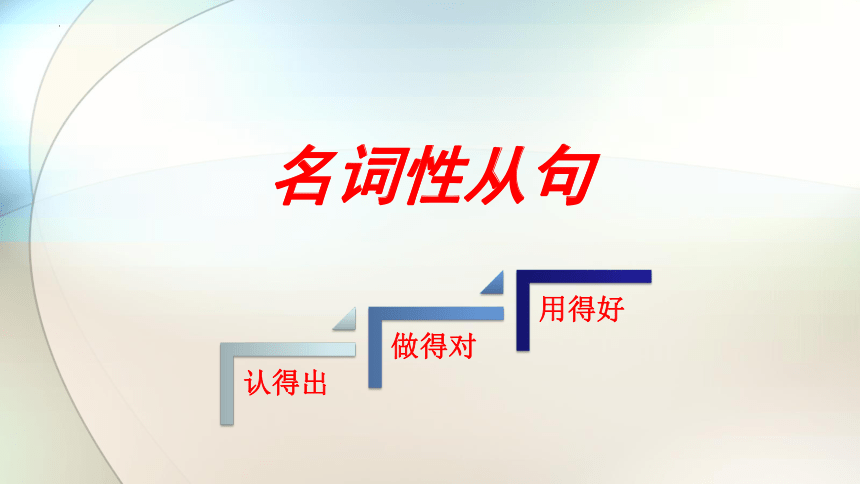 | |
| 格式 | pptx | ||
| 文件大小 | 646.1KB | ||
| 资源类型 | 教案 | ||
| 版本资源 | 通用版 | ||
| 科目 | 英语 | ||
| 更新时间 | 2023-09-16 09:53:20 | ||
图片预览

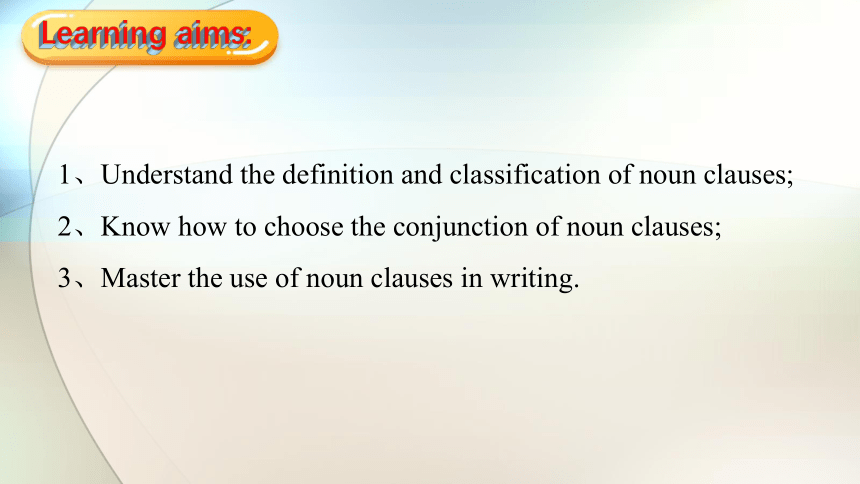

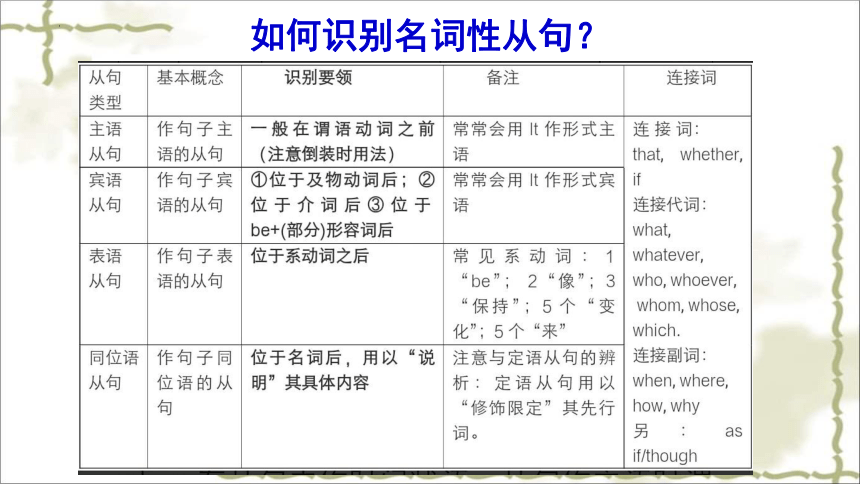
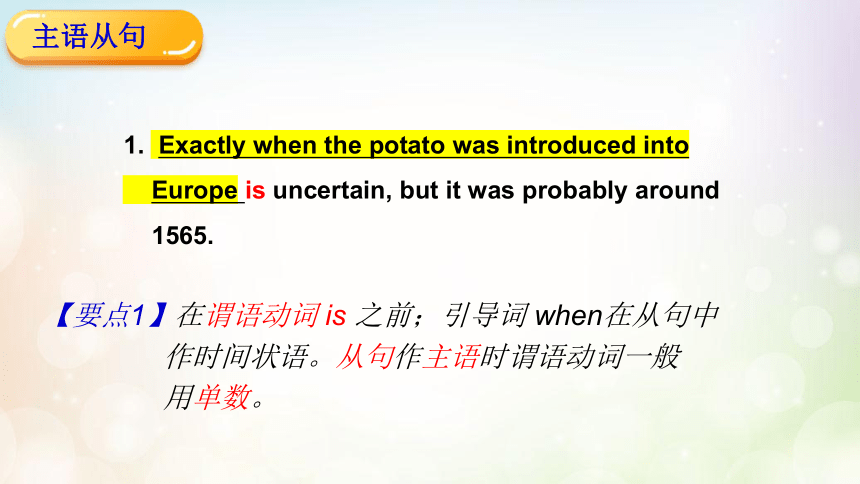
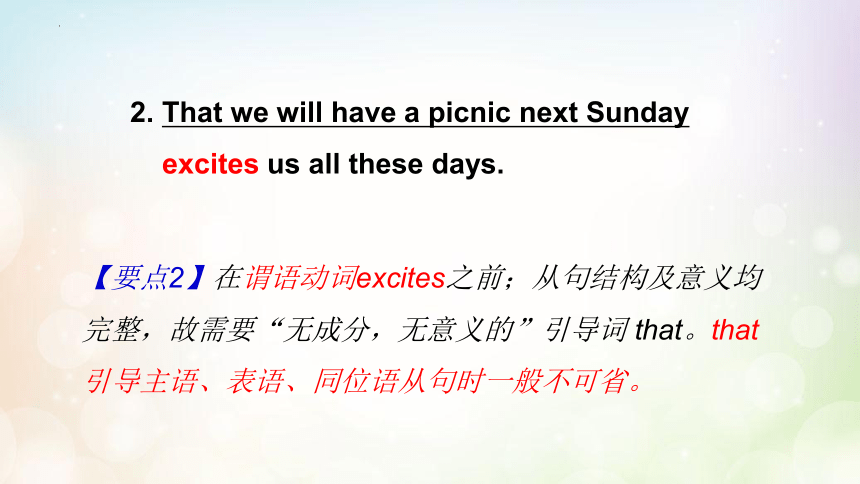
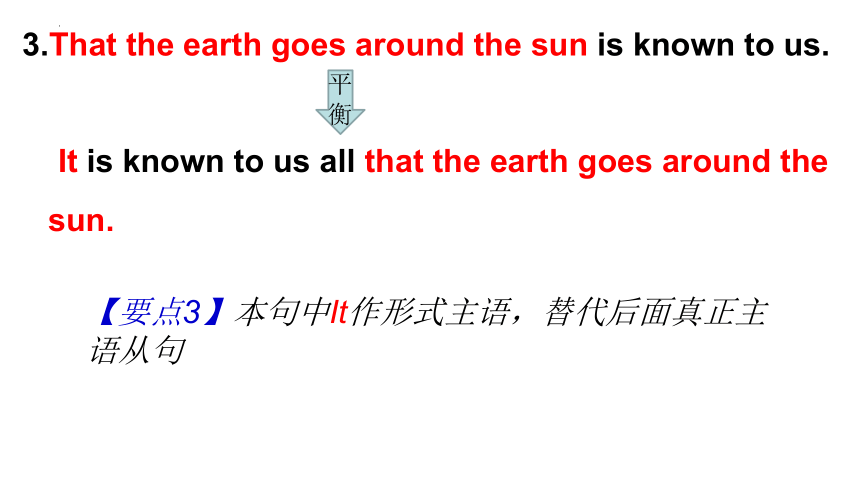
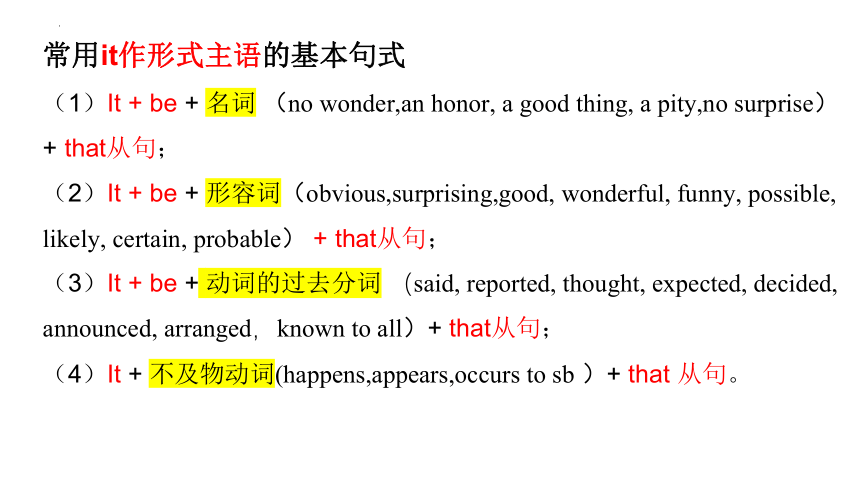
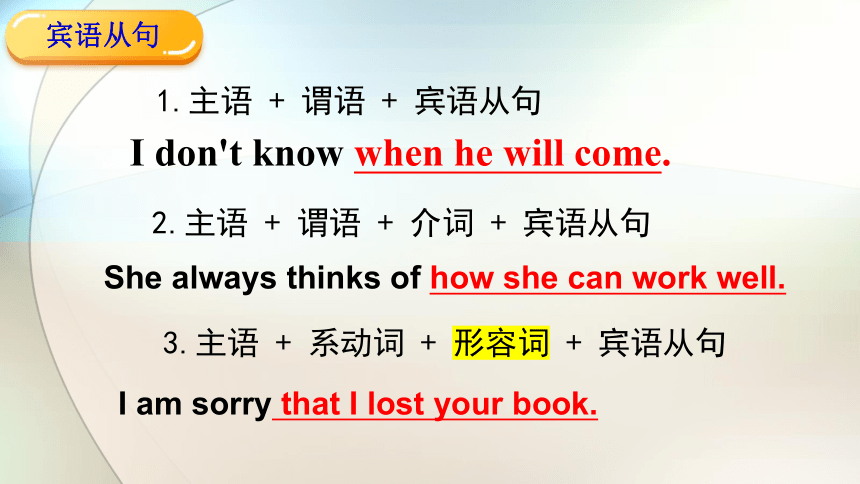
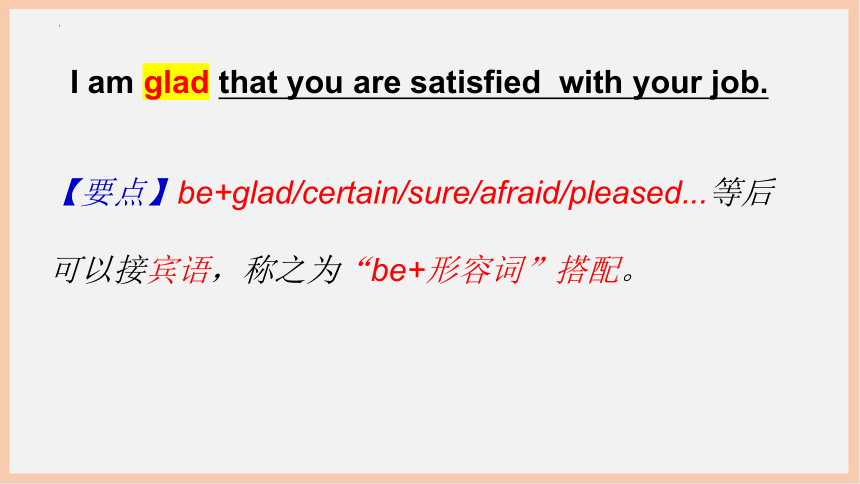
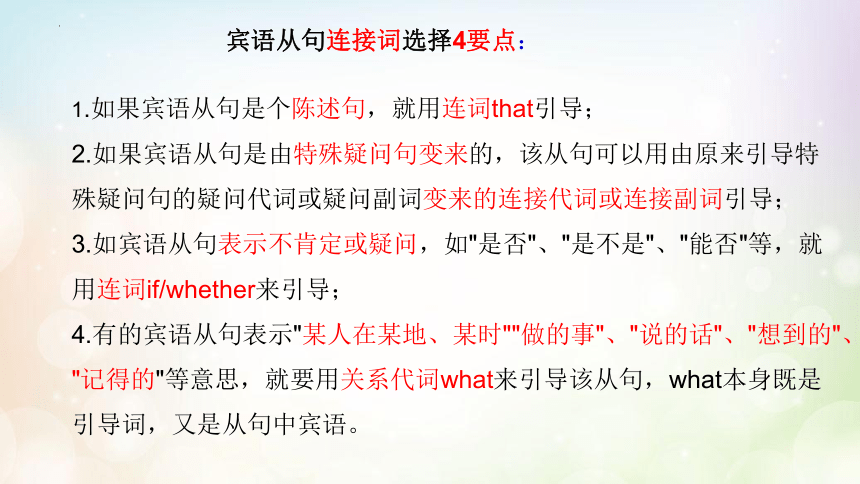
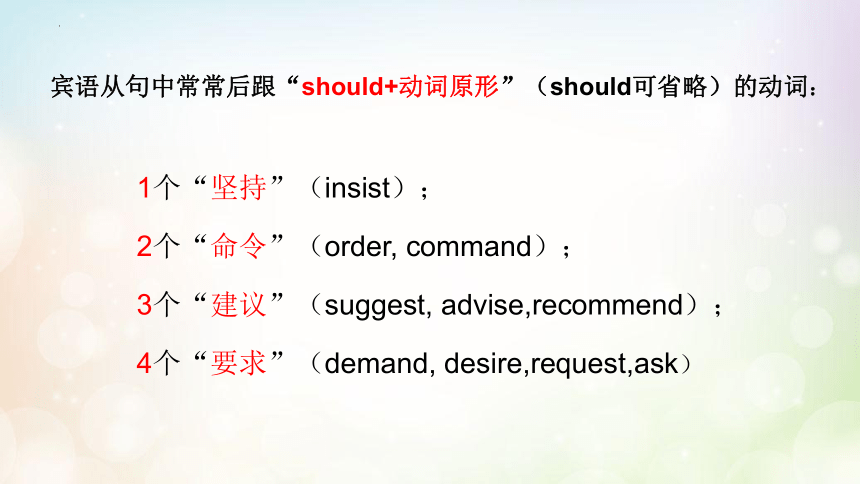
文档简介
(共33张PPT)
名词性从句
1、Understand the definition and classification of noun clauses;
2、Know how to choose the conjunction of noun clauses;
3、Master the use of noun clauses in writing.
Learning aims:
一、认得出:按所处位置辨认四类名词性从句
1. 定义:在复合句中起名词作用的从句
2. 类别:主语从句、宾语从句、表语从句和同位语从句。
如何识别名词性从句?
【要点1】在谓语动词 is 之前;引导词 when在从句中
作时间状语。从句作主语时谓语动词一般
用单数。
1. Exactly when the potato was introduced into
Europe is uncertain, but it was probably around
1565.
主语从句
【要点2】在谓语动词excites之前;从句结构及意义均完整,故需要“无成分,无意义的”引导词 that。that引导主语、表语、同位语从句时一般不可省。
2. That we will have a picnic next Sunday
excites us all these days.
It is known to us all that the earth goes around the sun.
【要点3】本句中It作形式主语,替代后面真正主语从句
3.That the earth goes around the sun is known to us.
平衡
常用it作形式主语的基本句式
(1)It + be + 名词 (no wonder,an honor, a good thing, a pity,no surprise)+ that从句;
(2)It + be + 形容词(obvious,surprising,good, wonderful, funny, possible, likely, certain, probable) + that从句;
(3)It + be + 动词的过去分词 (said, reported, thought, expected, decided, announced, arranged,known to all)+ that从句;
(4)It + 不及物动词(happens,appears,occurs to sb )+ that 从句。
1.主语 + 谓语 + 宾语从句
I don't know when he will come.
She always thinks of how she can work well.
2.主语 + 谓语 + 介词 + 宾语从句
3.主语 + 系动词 + 形容词 + 宾语从句
I am sorry that I lost your book.
宾语从句
I am glad that you are satisfied with your job.
【要点】be+glad/certain/sure/afraid/pleased...等后可以接宾语,称之为“be+形容词”搭配。
宾语从句连接词选择4要点:
1.如果宾语从句是个陈述句,就用连词that引导;
2.如果宾语从句是由特殊疑问句变来的,该从句可以用由原来引导特殊疑问句的疑问代词或疑问副词变来的连接代词或连接副词引导;
3.如宾语从句表示不肯定或疑问,如"是否"、"是不是"、"能否"等,就用连词if/whether来引导;
4.有的宾语从句表示"某人在某地、某时""做的事"、"说的话"、"想到的"、"记得的"等意思,就要用关系代词what来引导该从句,what本身既是引导词,又是从句中宾语。
宾语从句中常常后跟“should+动词原形”(should可省略)的动词:
1个“坚持”(insist);
2个“命令”(order, command);
3个“建议”(suggest, advise,recommend);
4个“要求”(demand, desire,request,ask)
作“是否”的意思讲时,在下列情况下一般只能用whether,不用if:
1. 引导主语从句并在句首时;
2. 引导表语从句时;
3. 引导从句作介词宾语时;
4. 连词后紧接“or not”时,但若分开时也可以用if;
5. 后接动词不定式时。
if 和 whether 引导宾语从句时的辨析
2) whether \ if 的区别
1.Please tell me __________you will go to the lectures tomorrow.
2.It all depends on ________the sky will clear up.
3.The question is ________the film is well worth seeing.
4._________he will be well tomorrow I’m not sure.
5.___________it is true remains a problem.
if/whether
whether
whether
Whether
Whether
that 在名词性从句中不能省略的情况
1.that引导多个并列的宾从中只能省略第一个that,其余的都不能省;
People say (that) I'm crazy and that I am blind.
2.that引导动宾从,在口语中常可省略,但引导介宾从、主从、表从、同从时一般不能省略。
That she will win the match is certain.
3.that 引导宾从后置,用形式宾语it代替时不能省;
China has made it clear to the world that it is strongly against
terrorism.
4.名词性从句本身为复合句且复合句在主句前时,that 不能省略。
He said that if I went there, he would go too.
注意
常见系动词巧记口诀:
1“be” (am, is, are);
2“像” (seem, appear);
3“保持” (keep, stay, remain);
5个“变化”(become, turn, grow, go, get);
5个“来” (sound, smell, taste, feel, look)
表语从句
1. The news that our Women Volleyball Team has won the game is exciting.
2. Word came that our Women Volleyball Team has won the game.
【简析】这两句均为同位语从句,特征是说明其前面名词的具体内容。其中第二句出现了“分割现象”——名词和同位语从句被谓语动词等分割开来。同位语从句通常由that引导,也可根据需要用到其他一些连接词。
同位语从句
advice、demand、doubt、fact、hope、idea、information、message、news、order、problem、promise、question、request、suggestion、truth、wish、word…
【知识拓展七】常见的同位语从句前的抽象名词
同位语从句和定语从句的区别:
that作为关系代词,可以引导定语从句,充当句子成分,在从句中作宾语时可以省略;
that引导同位语从句时,起连词的作用,没有实际意义,不充当句子成分,一般不能省略。
试比较下面两个例句:
1. I had no idea that you were here.
( that 引导同位语从句,不能省略)
2. Have you got the idea(that)this book gives
you of life in ancient Greece?
( that 引导定语从句,作宾语,可以省略)
二、做得对:按所缺成分和意义来确定连接词
1. 引导名词性从句的连接词常常被分为三类:
连 接 词:that, whether, if(不充当从句的任何成分)
连接代词:what, whatever, who, whoever, whom,
whose, which
连接副词:when, where, how, why
所谓“缺什么补什么”是指句型结构与连词之间的关系。
①如果从句中缺主语,指人用who,指物用what;
缺宾语,指人用whom,指物用what;
② 缺时间状语用when;地点状语用where;
原因状语用why;方式状语用how;
③ 缺定语用what或which;
④ 什么都不缺用that。
2. 抓住两个要点
“语法功能”(从句中所缺成分)
“词义辨析”(连词的意义)
【解析】how。figured out后接宾语从句,
空格后为形容词或副词时一般用 how。
1. As natural architects, the Pueblo Indians figured out exactly thick the adobe walls needed to be to make the cycle work on most days.
(2015·全国卷II,语法填空)
【高考链接】
【高考链接】
2. The manager put forward a suggestion ____ we should have an assistant. There is too much work to do.
【解析】that. 同位语从句说明 suggestion 的内容,而且同位语从句成分和意思都是完整的。用 that引导,that 不作成分,只是起着连接的作用。
【高考链接】
3. _____we understand things has a lot to do with what we feel.
【解析】How. 在谓语动词 has 之前,为主语从句。 主语从句中主谓宾齐全,但从意义上来讲句意不完整,how在此处作方式状语,意为“如何;怎样”。
【高考链接】
4.(2018·全国卷Ⅲ)I'm not sure ________ is more frightened, me or the female gorilla (大猩猩) that suddenly appears out of nowhere.
解析:how 分析句子结构可知,空格处是一个宾语从句。空格后的“thick”为形容词,因此空格处应用副词,故填how。
【高考链接】
5.(2017·天津高考)She asked me________ I had returned the books to the library, and I admitted that I hadn't.
解析:whether/if 句意:她问我是否已经把书还给图书馆了,我承认说我还没有还。分析句子结构可知,空格处引导宾语从句,且在从句中不作任何成分,只起连接作用;又根据句意可知此处表示“是否”,故用whether或if引导宾语从句。
三、用的好:按句子特征用好名词性从句
名词性从句作为英语中一个重要的语言现象,广泛存在于阅读理解、完形填空以及短文改错和语法填空中,对于这个项目的理解自然能够帮助我们很好地完成试卷预设的题目。不过,我们还可以充分利用名词性从句的特征来为我们的书面表达“增分添彩”呢。
TASK 1: Fill in the blanks with conjunctions (连接词)
1. ______we can’t get seems better than what we have.
2. _______ you don't like him is none of my business.
3.(2019·全国卷Ⅰ)While they are rare north of 88°, there is evidence ________ they range all the way across the Arctic, and as far south as James Bay in Canada.
What
That
that
4. _____ is a fact that English is being accepted as an international language.
5. I hate _____when people talk
with their mouths full.
6.(2019·北京高考)________ students do at college seems to matter much more than where they go.
It
it
What
7. _______ we’ll go camping tomorrow depends on the weather.
Whether
8.What the doctors really doubt is ________ my mother will recover from the serious disease soon.
whether / if
9.(2018·全国卷Ⅲ)I'm not sure ________ is more frightened, me or the female gorilla (大猩猩) that suddenly appears out of nowhere.
who
10. It is generally considered unwise to give a child _______ he or she wants.
11. Sarah hopes to become a friend of _______shares her interests.
12.(2018·浙江11月高考)It is possible ________ caffeine may cause birth defects (缺陷) in humans, too.
whatever
whoever
that
13. Suggestions have been put forward ____ more middle school graduates will be admitted into universities.
14.Doubts have been put forward __________ more middle school graduates will be admitted into universities.
that
why / whether
名词性从句
1、Understand the definition and classification of noun clauses;
2、Know how to choose the conjunction of noun clauses;
3、Master the use of noun clauses in writing.
Learning aims:
一、认得出:按所处位置辨认四类名词性从句
1. 定义:在复合句中起名词作用的从句
2. 类别:主语从句、宾语从句、表语从句和同位语从句。
如何识别名词性从句?
【要点1】在谓语动词 is 之前;引导词 when在从句中
作时间状语。从句作主语时谓语动词一般
用单数。
1. Exactly when the potato was introduced into
Europe is uncertain, but it was probably around
1565.
主语从句
【要点2】在谓语动词excites之前;从句结构及意义均完整,故需要“无成分,无意义的”引导词 that。that引导主语、表语、同位语从句时一般不可省。
2. That we will have a picnic next Sunday
excites us all these days.
It is known to us all that the earth goes around the sun.
【要点3】本句中It作形式主语,替代后面真正主语从句
3.That the earth goes around the sun is known to us.
平衡
常用it作形式主语的基本句式
(1)It + be + 名词 (no wonder,an honor, a good thing, a pity,no surprise)+ that从句;
(2)It + be + 形容词(obvious,surprising,good, wonderful, funny, possible, likely, certain, probable) + that从句;
(3)It + be + 动词的过去分词 (said, reported, thought, expected, decided, announced, arranged,known to all)+ that从句;
(4)It + 不及物动词(happens,appears,occurs to sb )+ that 从句。
1.主语 + 谓语 + 宾语从句
I don't know when he will come.
She always thinks of how she can work well.
2.主语 + 谓语 + 介词 + 宾语从句
3.主语 + 系动词 + 形容词 + 宾语从句
I am sorry that I lost your book.
宾语从句
I am glad that you are satisfied with your job.
【要点】be+glad/certain/sure/afraid/pleased...等后可以接宾语,称之为“be+形容词”搭配。
宾语从句连接词选择4要点:
1.如果宾语从句是个陈述句,就用连词that引导;
2.如果宾语从句是由特殊疑问句变来的,该从句可以用由原来引导特殊疑问句的疑问代词或疑问副词变来的连接代词或连接副词引导;
3.如宾语从句表示不肯定或疑问,如"是否"、"是不是"、"能否"等,就用连词if/whether来引导;
4.有的宾语从句表示"某人在某地、某时""做的事"、"说的话"、"想到的"、"记得的"等意思,就要用关系代词what来引导该从句,what本身既是引导词,又是从句中宾语。
宾语从句中常常后跟“should+动词原形”(should可省略)的动词:
1个“坚持”(insist);
2个“命令”(order, command);
3个“建议”(suggest, advise,recommend);
4个“要求”(demand, desire,request,ask)
作“是否”的意思讲时,在下列情况下一般只能用whether,不用if:
1. 引导主语从句并在句首时;
2. 引导表语从句时;
3. 引导从句作介词宾语时;
4. 连词后紧接“or not”时,但若分开时也可以用if;
5. 后接动词不定式时。
if 和 whether 引导宾语从句时的辨析
2) whether \ if 的区别
1.Please tell me __________you will go to the lectures tomorrow.
2.It all depends on ________the sky will clear up.
3.The question is ________the film is well worth seeing.
4._________he will be well tomorrow I’m not sure.
5.___________it is true remains a problem.
if/whether
whether
whether
Whether
Whether
that 在名词性从句中不能省略的情况
1.that引导多个并列的宾从中只能省略第一个that,其余的都不能省;
People say (that) I'm crazy and that I am blind.
2.that引导动宾从,在口语中常可省略,但引导介宾从、主从、表从、同从时一般不能省略。
That she will win the match is certain.
3.that 引导宾从后置,用形式宾语it代替时不能省;
China has made it clear to the world that it is strongly against
terrorism.
4.名词性从句本身为复合句且复合句在主句前时,that 不能省略。
He said that if I went there, he would go too.
注意
常见系动词巧记口诀:
1“be” (am, is, are);
2“像” (seem, appear);
3“保持” (keep, stay, remain);
5个“变化”(become, turn, grow, go, get);
5个“来” (sound, smell, taste, feel, look)
表语从句
1. The news that our Women Volleyball Team has won the game is exciting.
2. Word came that our Women Volleyball Team has won the game.
【简析】这两句均为同位语从句,特征是说明其前面名词的具体内容。其中第二句出现了“分割现象”——名词和同位语从句被谓语动词等分割开来。同位语从句通常由that引导,也可根据需要用到其他一些连接词。
同位语从句
advice、demand、doubt、fact、hope、idea、information、message、news、order、problem、promise、question、request、suggestion、truth、wish、word…
【知识拓展七】常见的同位语从句前的抽象名词
同位语从句和定语从句的区别:
that作为关系代词,可以引导定语从句,充当句子成分,在从句中作宾语时可以省略;
that引导同位语从句时,起连词的作用,没有实际意义,不充当句子成分,一般不能省略。
试比较下面两个例句:
1. I had no idea that you were here.
( that 引导同位语从句,不能省略)
2. Have you got the idea(that)this book gives
you of life in ancient Greece?
( that 引导定语从句,作宾语,可以省略)
二、做得对:按所缺成分和意义来确定连接词
1. 引导名词性从句的连接词常常被分为三类:
连 接 词:that, whether, if(不充当从句的任何成分)
连接代词:what, whatever, who, whoever, whom,
whose, which
连接副词:when, where, how, why
所谓“缺什么补什么”是指句型结构与连词之间的关系。
①如果从句中缺主语,指人用who,指物用what;
缺宾语,指人用whom,指物用what;
② 缺时间状语用when;地点状语用where;
原因状语用why;方式状语用how;
③ 缺定语用what或which;
④ 什么都不缺用that。
2. 抓住两个要点
“语法功能”(从句中所缺成分)
“词义辨析”(连词的意义)
【解析】how。figured out后接宾语从句,
空格后为形容词或副词时一般用 how。
1. As natural architects, the Pueblo Indians figured out exactly thick the adobe walls needed to be to make the cycle work on most days.
(2015·全国卷II,语法填空)
【高考链接】
【高考链接】
2. The manager put forward a suggestion ____ we should have an assistant. There is too much work to do.
【解析】that. 同位语从句说明 suggestion 的内容,而且同位语从句成分和意思都是完整的。用 that引导,that 不作成分,只是起着连接的作用。
【高考链接】
3. _____we understand things has a lot to do with what we feel.
【解析】How. 在谓语动词 has 之前,为主语从句。 主语从句中主谓宾齐全,但从意义上来讲句意不完整,how在此处作方式状语,意为“如何;怎样”。
【高考链接】
4.(2018·全国卷Ⅲ)I'm not sure ________ is more frightened, me or the female gorilla (大猩猩) that suddenly appears out of nowhere.
解析:how 分析句子结构可知,空格处是一个宾语从句。空格后的“thick”为形容词,因此空格处应用副词,故填how。
【高考链接】
5.(2017·天津高考)She asked me________ I had returned the books to the library, and I admitted that I hadn't.
解析:whether/if 句意:她问我是否已经把书还给图书馆了,我承认说我还没有还。分析句子结构可知,空格处引导宾语从句,且在从句中不作任何成分,只起连接作用;又根据句意可知此处表示“是否”,故用whether或if引导宾语从句。
三、用的好:按句子特征用好名词性从句
名词性从句作为英语中一个重要的语言现象,广泛存在于阅读理解、完形填空以及短文改错和语法填空中,对于这个项目的理解自然能够帮助我们很好地完成试卷预设的题目。不过,我们还可以充分利用名词性从句的特征来为我们的书面表达“增分添彩”呢。
TASK 1: Fill in the blanks with conjunctions (连接词)
1. ______we can’t get seems better than what we have.
2. _______ you don't like him is none of my business.
3.(2019·全国卷Ⅰ)While they are rare north of 88°, there is evidence ________ they range all the way across the Arctic, and as far south as James Bay in Canada.
What
That
that
4. _____ is a fact that English is being accepted as an international language.
5. I hate _____when people talk
with their mouths full.
6.(2019·北京高考)________ students do at college seems to matter much more than where they go.
It
it
What
7. _______ we’ll go camping tomorrow depends on the weather.
Whether
8.What the doctors really doubt is ________ my mother will recover from the serious disease soon.
whether / if
9.(2018·全国卷Ⅲ)I'm not sure ________ is more frightened, me or the female gorilla (大猩猩) that suddenly appears out of nowhere.
who
10. It is generally considered unwise to give a child _______ he or she wants.
11. Sarah hopes to become a friend of _______shares her interests.
12.(2018·浙江11月高考)It is possible ________ caffeine may cause birth defects (缺陷) in humans, too.
whatever
whoever
that
13. Suggestions have been put forward ____ more middle school graduates will be admitted into universities.
14.Doubts have been put forward __________ more middle school graduates will be admitted into universities.
that
why / whether
